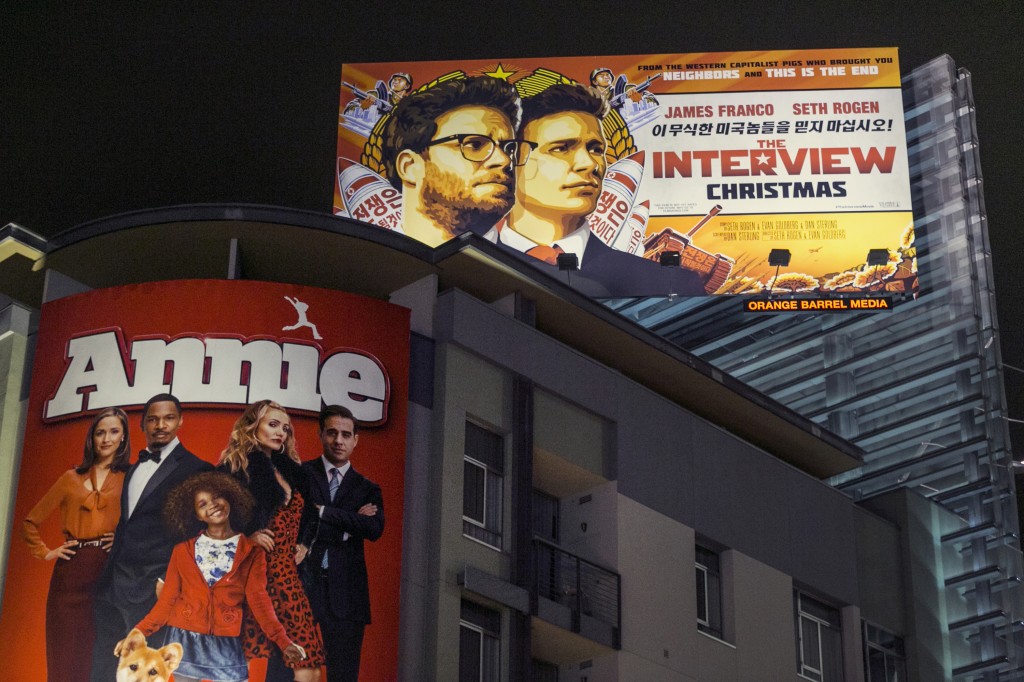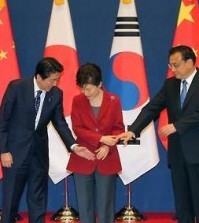- California Assembly OKs highest minimum wage in nation
- S. Korea unveils first graphic cigarette warnings
- US joins with South Korea, Japan in bid to deter North Korea
- LPGA golfer Chun In-gee finally back in action
- S. Korea won’t be top seed in final World Cup qualification round
- US men’s soccer misses 2nd straight Olympics
- US back on track in qualifying with 4-0 win over Guatemala
- High-intensity workout injuries spawn cottage industry
- CDC expands range of Zika mosquitoes into parts of Northeast
- Who knew? ‘The Walking Dead’ is helping families connect
‘Interview’ ordeal at Sony just its latest crisis

A banner for “The Interview”is posted outside Arclight Cinemas, Wednesday, Dec. 17, 2014, in the Hollywood section of Los Angeles. A U.S. official says North Korea perpetrated the unprecedented act of cyberwarfare against Sony Pictures that exposed tens of thousands of sensitive documents and escalated to threats of terrorist attacks that ultimately drove the studio to cancel all release plans for the film at the heart of the attack, “The Interview.” (AP Photo/Damian Dovarganes)
TOKYO (AP) — How do you say “damage control” in Japanese? Sony Corp. is sealed within a hermetic cone of silence as executives try to prevent the slow motion train wreck at Sony Pictures from damaging the rest of the sprawling business empire.
Sony’s miseries with its television and smartphone businesses were bad enough. Now its American movie division, a trophy asset, is facing tens of millions of dollars in losses from leaks by hackers that attacked the company over a movie that spoofs an assassination of North Korean leader Kim Jong-un.
The studio’s reputation is in tatters as embarrassing revelations spill from tens of thousands of leaked emails that could damage its relationships with stars and give other studios an advantage.
The fallout, financial and otherwise, from the hack is a messy distraction for top executives of the Tokyo-based maker of the PlayStation 4 video game machines, Spider-Man movies and Xperia smartphones.
For now, Sony’s damage control strategy in Japan appears to be waiting out the crisis in silence.
The group headquarters in downtown Tokyo’s port district is refusing all comment and referring questions about Sony Pictures to the movie division’s headquarters in Culver City, California.
“A rumor only lasts 75 days,” goes an old Japanese saying.
“This is seen mainly as an attack on Hollywood,” said Damian Thong, a senior analyst at Macquarie Capital Securities. “I feel they want to clean it up as fast they can and just get on with life. That’s what they want.”
Since Sony Corp. and Sony Pictures have long been run as entirely separate companies, he said there might be little spillover from what a U.S. official said was an act of North Korean cyberwarfare. The studio canceled all release plans for the North Korean spoof movie “The Interview” after the hackers this week made threats of terror attacks against cinemas that showed the film.
As far as Japan is concerned, it’s as if the movie doesn’t even exist. Sony Pictures never planned a Japanese release for the film.
Sony will lose money from the leaks of some movies and proprietary information, and perhaps also from possible lawsuits by employees whose data was disclosed.
Thong expects the amount to range from 20 billion yen to 25 billion yen ($170 million-$210 million). Enough to hurt, but for a company that booked 7.77 trillion yen ($65.8 billion) in sales in the fiscal year that ended in March, not fatal.
Before the hackers struck, Sony was forecasting $8.1 billion in annual sales for its movie division out of total sales of 7.8 trillion yen ($66 billion).
It’s possible that all the uproar could lead to the movie making more money that it might have otherwise, said Benjamin Cavender, a senior consumer electronics analyst at China Research Group in Shanghai. Sony Pictures has said it has no further release plans for the film but that does not rule out it being revived later.
“In the short term, it hurts. In the longer term it might be positive in terms of turning the movie into a cult classic,” Cavender said.
Lost revenues related to “The Interview” are hardly the worst of the tribulations for a company that has lost money in six of the seven past years amid intense competition from Apple Inc. of the U.S., Samsung Electronics Co. of South Korea and cheaper Chinese rivals.
Despite improved performances by its cameras, TVs and game businesses, write-offs for its mobile phone division have kept Sony awash in red ink. Before the Sony Pictures crisis blew up, it was expecting a 230 billion yen ($2.1 billion) loss for the year through March 2015.
Often, as one part of Sony’s business recovers, another area falters. By the same token, despite fiascos like “The Interview,” Sony Pictures has had massive hits in movies like “Spider-Man,” ”Men in Black” and “Skyfall.”
But some investors in Sony say the problems at Sony Pictures reflect the fundamental weakness of a consumer gadgets company trying to marry its culture with a Hollywood studio. Sony bought the predecessor of Sony Pictures in 1989.
“I doubt whether Sony, which is a hardware and electronics company, can manage Sony Picture Entertainment. I don’t think Sony’s management over them is really functioning,” said Mitsushige Akino, chief fund manager at Ichiyoshi Asset Management in Tokyo.
Sony’s one-time status as an icon that pioneered products such as the Walkman music player is scarcely known to a generation of iPad and Galaxy lovers and it has never realized the blockbuster synergies it hoped to gain by owning both electronics and entertainment businesses.
Sony was one of the first Japanese firms to successfully tackle world markets. Nearly three-quarters of its annual sales are overseas and about 42 percent of its shareholders are foreign. But the company remains very true to the conservative values of Japanese corporate culture in how it is run.
Even though Sony shareholders heckled Chief Executive Kazuo Hirai and other top executives over losses earlier this year, they still voted to keep Hirai at the helm.
The silence on the latest crisis is typical of Japanese companies, said Cavender.
“Often there is no statement or even if there is one you have to read between the lines because nobody ever says anything directly,” he said. “Coming out with a statement might go a long way toward ending the story.”














